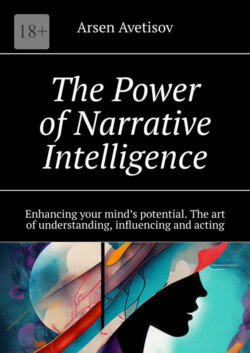Читать книгу The Power of Narrative Intelligence. Enhancing your mind’s potential. The art of understanding, influencing and acting - Арсен Аветисов - Страница 10
A Parable Is a Form of Narrative
Special learning space.
ОглавлениеHumans are not ideally set up to understand logic; they
are ideally set up to understand stories. ― Roger Shank
A person always needs a specific space where they can reflect, learn, understand and accept their place in this world and the place that they have yet to find. This is not a home, work, or social media, which has become a part of today’s world. This is where it all started, intelligence and its narratives.
One of the forms of narratives that help us understand the world and our place in it is a parable. A parable is a brief, didactic story presented in an allegorical form. Merriam-Webster’s Collegiate Dictionary defines a parable as an 'example… that illustrates a moral attitude or a religious principle.' Parables allow us to give knowledge a live and dynamic image, to imprint it deeply in memory and present it as a complete idea that has meaning. Any parable captivates the listener not only with its plot. The parables are imaginative and concise, they are full of metaphors, they are emotional.
In real life, we often encounter parables that relate to our daily problems. Such parables are widely known and often quoted, for instance, King Solomon’s proverbs. And even today, thousands of years later, they are able to make a strong impression on listeners. The works of art based on them are among those known to many. Other well-known parables are no less meaningful.
For example, the Parable of the Sower:
'Behold, a sower went forth to sow; and when he sowed, some seeds fell by the way side, and the fowls came and devoured them up. Some fell upon stony places, where they had not much earth: and forthwith they sprung up, because they had no deepness of earth. And when the sun was up, they were scorched; and because they had no root, they withered away. And some fell among thorns; and the thorns sprung up, and choked them. But other fell into good ground, and brought forth fruit, some an hundredfold, some sixtyfold, some thirtyfold'.
What is this parable about? It is about many things, including the process of becoming a person and the role of conditions and environment in this process. Much of our life really depends on how deep the seeds of knowledge fall into us. And how much we are affected by external factors – birds pecking at grain, weeds that grow near us. If we do not focus, if the knowledge and experience we gain are not taken into account in such a way that they are transformed into competencies, if they are not connected with our values and life principles, they will eventually wither and become worthless. The eighty-nine words of the Parable of the Sower provide a clear and concise SWOT analysis of the possible forms of this process.
There are many similar parables or stories, but they are probably not as scalable, profound and artistically flawless as the classics. We wonder how they manage to very delicately connect so many simple events, captivate us and focus on the essence of the presentation. An entire science, narratology, is devoted to this phenomenon.
